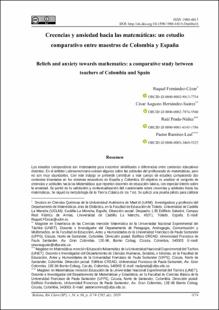Creencias y ansiedad hacia las matemáticas: un estudio comparativo entre maestros de Colombia y España
Beliefs and anxiety towards mathematics: a comparative study between teachers of Colombia and Spain
Artículo de revista
2020
Bolema - Mathematics Education Bulletin
Brasil
Los estudios comparativos son interesantes para encontrar similitudes o diferencias entre contextos educativos distintos. En el ámbito Latinoamericano existen algunos sobre las actitudes del profesorado de matemáticas, pero no son muy abundantes. Con este trabajo se pretende contribuir a este cuerpo de estudios comparando dos contextos insertados en los sistemas educativos de España y Colombia. El objetivo es analizar el conjunto de creencias y actitudes hacia las Matemáticas que reportan docentes de educación básica, con especial interés sobre la ansiedad. Se partió de la validación y contextualización del cuestionario sobre creencias y actitudes hacia las matemáticas. Se siguió la metodología de la Teoría Clásica de los Test. Se aplicó una prueba piloto para calibrar el instrumento; luego se administró a una muestra de 232 docentes en ambos países. Con los datos obtenidos se realizó un análisis comparativo para identificar semejanzas y diferencias entre los grupos. Los resultados evidencian similitudes epistemológicas en cuanto a los ítems relacionados con el euclidianismo. Sin embargo, en cuanto al cuasi-empirismo y el constructivismo se presentan marcadas diferencias por país. En relación con la ansiedad, las respuestas de los docentes divergen, dependiendo del contexto geográfico. Destaca el mayor nivel de ansiedad de los docentes españoles en comparación con los colombianos. Se probó que factores como el nivel de estudios y el tipo de contratación determina su nivel de ansiedad y su sistema de creencias. A futuro convendría comprobar si los niveles de ansiedad afectan, también, a la práctica docente durante la enseñanza de las matemáticas. Comparative studies are an interesting way to find similarities or differences between different educational contexts. In Latin America, there are some studies about the attitudes of math teachers, but they are not very abundant. This work is intended to contribute to this body of studies by comparing two contexts inserted in the educational systems of Spain and Colombia. The objective is to analyze the set of beliefs and attitudes towards Mathematics, that teachers of basic education report, with special interest on anxiety. It is based on the validation and contextualization of the questionnaire on beliefs and attitudes towards mathematics. The methodology of the Classical Test Theory was followed. A pilot test was applied to calibrate the instrument; It was then administered to a sample of 232 teachers in both countries. With the data obtained, a comparative analysis was carried out to identify similarities and differences between the groups. The results show epistemological similarities regarding the items related to Euclideanism. However, in terms of quasi-empiricism and constructivism, there are marked differences by country. In relation to anxiety, teachers’ responses differ depending on the geographical context. It highlights the higher level of anxiety of Spanish teachers compared to Colombians. It was proved that factors such as the educational level and recruitment type determine your anxiety level and your belief system. In the future, it would be useful to verify whether anxiety levels also affect teaching practice during the teaching of mathematics.
Descripción:
Creencias y ansiedad hacia las matemáticas un estudio comparativo entre maestros de Colombia y España.pdf
Título: Creencias y ansiedad hacia las matemáticas un estudio comparativo entre maestros de Colombia y España.pdf
Tamaño: 527.6Kb
 PDF
PDF
 LEER EN FLIP
LEER EN FLIP
Título: Creencias y ansiedad hacia las matemáticas un estudio comparativo entre maestros de Colombia y España.pdf
Tamaño: 527.6Kb
 PDF
PDF
 LEER EN FLIP
LEER EN FLIP
















